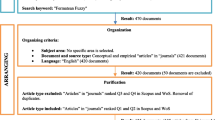Abstract
This paper presents a way to combine outcomes of various studies in a meta analysis framework that can use the results of mixed methods and also provide query based output for intelligent decision making. We enhance the Qualitative Comparative Analysis by utilizing fuzzy logic programming to provide effective ways of combining output of various studies. The results from various studies are used to develop an axiomatic knowledge database, and then the fuzzy programming logic engine processes it to present logical answers to decision maker’s queries to the system. We present a sample application to show the methodology being applied to an example problem.




Similar content being viewed by others
References
Beatty, S.E., Smith, S.M.: External search effort: an investigation across several product categories. J. Consum. Res 14(1), 83–95 (1987)
Burton, S., Lichtenstein, D.R., Netemeyer, R.G., Garretson, J.A.: A scale for measuring attitude toward private label products and an examination of its psychological and behavioral correlates. J. Acad. Market. Sci 26(4), 293–306 (1998)
Creswell, J.W.: Research Design: Qualitative, Quantitative, and Mixed Methods Approaches. Sage Publications, Thousand Oaks (2013)
Donthu, N., Garcia, A.: The internet shopper. J. Advert. Res 39(3), 52–52 (1999)
Griffin, M., Babin, B.J., Attaway, J.S.: Anticipation of injurious consumption outcomes and its impact on consumer attributions of blame. J. Acad. Market. Sci 24(4), 314–327 (1996)
Guadarrama, S., Munoz, S., Vaucheret, C.: Fuzzy prolog: a new approach using soft constraints propagation. Fuzzy Sets Syst. 144(1), 127–150 (2004)
Jacoby, J., et al.: Perspectives on information overload. J. Consum. Res 10(4), 432 (1984)
Klawonn, F. and Kruse, R., Lukasiewicz Logic Based Prolog, Mathware & Soft Computing. Vol. 1 Núm. 1 p. 5-29. (1994)
Krishen, A.S., Agarwal, S., Kachroo, P.: Is having accurate knowledge necessary for implementing safe practices? a consumer folk theories-of-mind perspective on the impact of price. Eur. J. Market 50(5/6), 1073 (2016a)
Krishen, A.S., Agarwal, S., Kachroo, P., Raschke, R.L.: Framing the value and valuing the frame? algorithms for child safety seat use. J. Bus. Res 69(4), 1503–1509 (2016b)
Krishen, A.S., Raschke, R., Kachroo, P., LaTour, M., Verma, P.: Promote me or protect us? the framing of policy for collective good. Eur. J. Market 48, 742–760 (2014a)
Krishen, A.S., Raschke, R.L., Kachroo, P., Mejza, M., Khan, A.: Interpretation of public feedback to transportation policy: a qualitative perspective. Transp. J 53(1), 26–43 (2014b)
Lee, R.C.: Fuzzy logic and the resolution principle. JACM 19(1), 109–119 (1972)
Li, D., Liu, D.: A Fuzzy Prolog Database System. Wiley, New York (1990)
Lord, K.R., Lee, M.-S., Sauer, P.L.: Program context antecedents of attitude toward radio commercials. J. Acad. Market. Sci 22(1), 3–15 (1994)
Malhotra, N.K.: Information load and consumer decision making. J. Consum. Res 8(4), 419–430 (1982)
Malpas, J.: Prolog: a relational language and its applications. Prentice-Hall, Upper Saddle River (1986)
Martin, T., Baldwin, J.F., Pilsworth, B.: The implementation of fprologa fuzzy prolog interpreter. Fuzzy Sets Syst. 23(1), 119–129 (1987)
Motro, A., Smets, P. (eds.): Uncertainty Management in Information Systems: From Needs to Solutions, Springer, New York (2012)
Mukaidono, M., Shen, Z., Ding, L.: Fundamentals of fuzzy prolog. Int. J. Approximat. Reason 3(2), 179–193 (1989)
Nguyen, H.T., Walker, E.A.: A First Course in Fuzzy Logic. CRC Press, Boca Raton (2005)
Ragin, C.C.: Redesigning Social Inquiry: Fuzzy Sets and Beyond, vol. 240. Wiley, Chicago (2008)
Ragin, C.C.: The Comparative Method: Moving Beyond Qualitative and Quantitative Strategies. University of California Press, Los Angeles (2014)
Shim, S., Gehrt, K.C.: Hispanic and native american adolescents: an exploratory study of their approach to shopping. J. Retail. 72(3), 307–324 (1996)
Stubbs, M.: Discourse Analysis: The Sociolinguistic Analysis of Natural Language, vol. 4. University of Chicago Press, Chicago (1983)
Tashakkori, A., Teddlie, C.: Sage Handbook of Mixed Methods in Social & Behavioral Research. Sage, Thousand Oaks (2010)
Vaucheret, C., Guadarrama, S., and Muñoz, S., Fuzzy prolog: A simple general implementation using (r), In: International Conference on Logic for Programming Artificial Intelligence and Reasoning, pp. 450–463. Springer, New York (2002)
Yoo, B., Donthu, N., Lee, S.: An examination of selected marketing mix elements and brand equity. J. Acad. Market Sci 28(2), 195–211 (2000)
Author information
Authors and Affiliations
Corresponding author
Rights and permissions
About this article
Cite this article
Kachroo, P., Krishen, A. & Agarwal, S. Fuzzy logic programming based knowledge analysis for qualitative comparative analysis. Qual Quant 51, 2101–2113 (2017). https://doi.org/10.1007/s11135-016-0453-8
Published:
Issue Date:
DOI: https://doi.org/10.1007/s11135-016-0453-8




